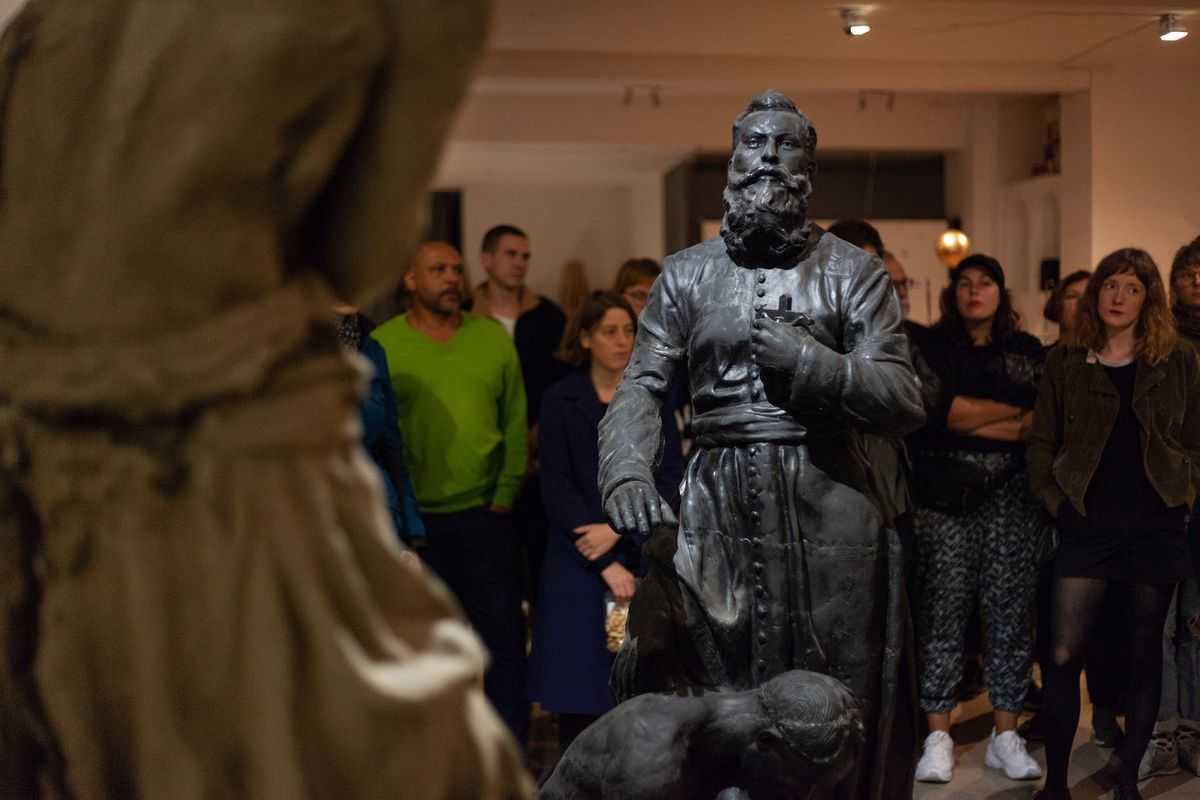GEOGRAPHIES OF IMAGINATION curated by Antonia Alampi (guest DAI 2018-2019) and Bonaventure Soh Bejeng Ndikungat (guest DAI 2015-2016) is a project within DIS-OTHERING: BEYOND AFROPOLITAN AND OTHER LABELS –on the necessary deconstruction of “othering” practices in European cultural institutions.
DIS-OTHERING: BEYOND AFROPOLITAN AND OTHER LABELS is a collaboration between BOZAR–Centre for Fine Arts (Brussels), Kulturen in Bewegung (Vienna) and SAVVY Contemporary (Berlin)
It consists of an exhibition, symposia, a festival, talks and performances, a residency program, mapping research, and a website, all manifesting in 2018 and 2019 in Berlin, Brussels, Vienna and Warsaw. These different formats share the bringing together of artists, communities, thinkers and people of all walks of life to reflect on contemporary processes and technologies of “Dis-Othering.”
EXHIBITION
OPENING 13.09.2018 19:00
13.09.–11.11.2018 Thur-Sun 14:00–19:00
Berlin Art Week Opening Hours: 26.09.2018 14:00–19:00
WITH Salwa Aleryani, Heba Y. Amin, American Artist, Rossella Biscotti, Chimurenga, Saddie Choua, Michele Ciacciofera, Anna Binta Diallo, Dimitri Fagbohoun, Mahir Jahmal, Jackie Karuti, Anna Líndal, Ibrahim Mahama, Tanja Muravskaja, Oscar Murillo, Daniela Ortiz and Sandra Schäfer.
INVOCATIONS
14.09.–15.09.2018
WITH Salwa Aleryani, Heba Y. Amin, Rossella Biscotti, Michele Ciacciofera, Andrea Cusumano, Hamid Dabashi, Anna Binta Diallo, Discoteca Flaming Star, Drummers of Joy (feat. Ekow Alabi, Kofi Asamoah, Akinola Famson, Eric Sunday Owusu), Dimitri Fagbohoun, Nacira Guénif-Souilamas, Helon Habila, Hector Thami Manekehla, Night (feat. Jason Kunwar, Niraj Shakya, Sudhir Acharya, Shiva Kumar Khatri, Simma Rai), Wayne Modest, Musa Okwonga, Daniela Ortiz, Protektorama [5.0 - 5.4.7 ], Sandra Schäfer, Tito Valery and Jelena Vesić
GUIDED TOURS
If not announced otherwise, all tours start at 16:00
26.09.2018 English by Antonia
27.09.2018 English by Pia
28.09.2018 Portuguese (Português) by António
13.10.2018 English by Olani
18.10.2018 14:00 Pidgin, Nguemba & English by Bonaventure
18.10.2018 French (Français) by Arlette
19.10.2018 Italian (Italiano) by Antonia
25.10.2018 Spanish (Español) by Raisa
28.10.2018 Romanian (Română) by Jasmina
02.11.2018 German (Deutsch) by Anna
Through GEOGRAPHIES OF IMAGINATION we engage in confabulations to build connections between the varied and conflicting uses of imagination in constructing otherness and the role of geography as a tool of power. How is power situated at the core of processes of othering, and how are these processes connected to forms of belonging that we could also relate to notions of territoriality and possession? The other, writes Ta-Nehisi Coates, exists beyond the border of the great “belonging”, something that contributed to producing the sense of anxiety that brought white, patriarchal supremacists of the far right to politically emerge again in recent elections, in the US as much as in several European countries.
GEOGRAPHIES OF IMAGINATION is thought as an exhibition, a research, a cartographic time-line and above all a space where artists come together to weave, through very different positions, possible formulas towards a core question bell hooks poses and we want to pose over and over again: How can we –now understood as humanity– find a sense of belonging that will encourage and bring us to “embrace all of the conditions of the world”, even beyond the human species and towards the earth as a whole?
The Berlin chapter of the project, DIS-OTHERING AS A METHOD: LEH ZO, A ME KE NDE ZA (which literally translates from Ngemba as “Keep yours and I keep mine”), is conceived as a series of discourses, performances and an exhibition that stand out as platforms on and through which, contemporary processes and technologies of ‘Othering’ could be reflected upon. It is not about the “Other” – which is just the “product.” The project is a deliberation on the amoebic and morphed methodologies employed by institutions and societies at large in constructing and cultivating “Otherness” in our contemporaneity. It is about the commodification and the cooption of the “Other” and the reinforced acts of "Othering".
In a political moment defined once again by the need to identify an enemy as the cause of one´s own miseries from the micro to the macro scale, of identity politics either played against or in favor of someone´s practice, this project comes as particularly relevant.

